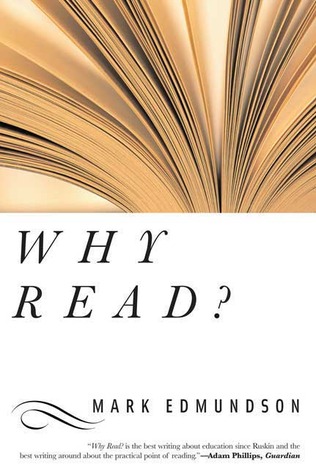
Why Read? by Mark Edmundson
Bloomsbury USA, originally published in 2004
My rating: 3 of 5 stars
English departments are under attack in higher education. To be precise, courses that involve reading literature are under attack. Some people still prize being able to express oneself well in writing – maybe what we’ll have down the road is simply “Writing Departments.”
Not if Mark Edmundson has his way. Why Read? is an extended essay on the value of reading, an expansion of a widely circulated Harpers Magazine article [On the Uses of the Liberal Arts]. His answer might be quite surprising to those who have been around English Departments of late. He argues that reading is important for great writers’ exploration of the big questions of life:
- Why are we here?
- What is a life well lived?
- Why should character matter?
He believes books can change us and the test of a good book is that we can live its truth.
Against all the critical approaches that deconstruct literature, he argues for reading authors sympathetically – indeed “becoming” the author while retaining one’s sense of oneself – so deeply entering into the author’s world that we in some way identify with him or her. Likewise, he even suggests identifying with characters in novels. And he teaches at the University of Virginia for goodness sake!
He has a simple test for what he thinks ought to be canonical-it tests and transforms us and has done so for many people over a period of time. He includes writers from beyond the Western world without embracing trendiness.
What was striking for me is that Edmundson speaks of great works of literature as Christians would speak of the Bible. In fact, he acknowledges that in a world that no longer believes in the transcendent (and this is where he thinks we are going, and evidently where he is) these books help us define our truth and shape and expand our lives.
What is fascinating to me is this recognition of the power of words to change us. Edmundson and so many writers dealing with the current crisis of higher education seem “god haunted”. They are trying to recover or replace what was lost when we ceased believing that there was a connection between the God who speaks creation into existence and reveals himself in words, and the belief that the study of those words and the world of discourse beyond scripture has a power to change us. People like Edmundson still want to believe the latter while denying the former. I question whether this is ultimately sustainable, much as I share Edmundson’s love of these works.

Thank-you to Bob for sharing Review: Why Read? from his blog Bob on Books (11/13/2013). While editing the post, I enjoyed watching a C-Span Booknotes Interview of Mark Edmundson (58 min, 5 sec). I found this interview helpful in bringing out Mark Edmundson’s understanding of a number of topics including the relationship of the professor to the student, liberalism to conservativism, and the canon of literature to the Bible. ~ Thomas B. Grosh IV, Associate Director, Emerging Scholars Network
Bob Trube is Associate Director of Faculty Ministry and Director of the Emerging Scholars Network. He blogs on books regularly at bobonbooks.com. He resides in Columbus, Ohio, with Marilyn and enjoys reading, gardening, choral singing, and plein air painting.

Leave a Reply